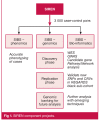Stroke genomics in people of African ancestry: charting new paths
- PMID: 25962947
- PMCID: PMC4557488
- DOI: 10.5830/CVJA-2015-039
Stroke genomics in people of African ancestry: charting new paths
Abstract
One in six people worldwide will experience a stroke in his/her lifetime. While people in Africa carry a disproportionately higher burden of poor stroke outcomes, compared to the rest of the world, the exact contribution of genomic factors to this disparity is unknown. Despite noteworthy research into stroke genomics, studies exploring the genetic contribution to stroke among populations of African ancestry in the United States are few. Furthermore, genomics data in populations living in Africa are lacking. The wide genomic variation of African populations offers a unique opportunity to identify genomic variants with causal relationships to stroke across different ethnic groups. The Stroke Investigative Research and Educational Network (SIREN), a component of the Human Health and Heredity in Africa (H3Africa) Consortium, aims to explore genomic and environmental risk factors for stroke in populations of African ancestry in West Africa and the United States. In this article, we review the literature on the genomics of stroke with particular emphasis on populations of African origin.
References
Publication types
MeSH terms
Grants and funding
LinkOut - more resources
Full Text Sources
Medical

